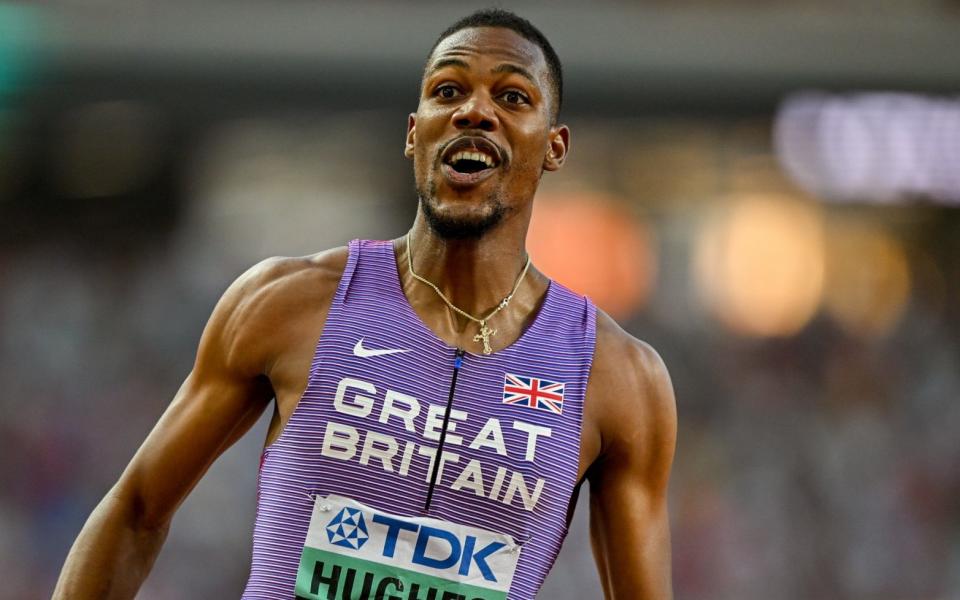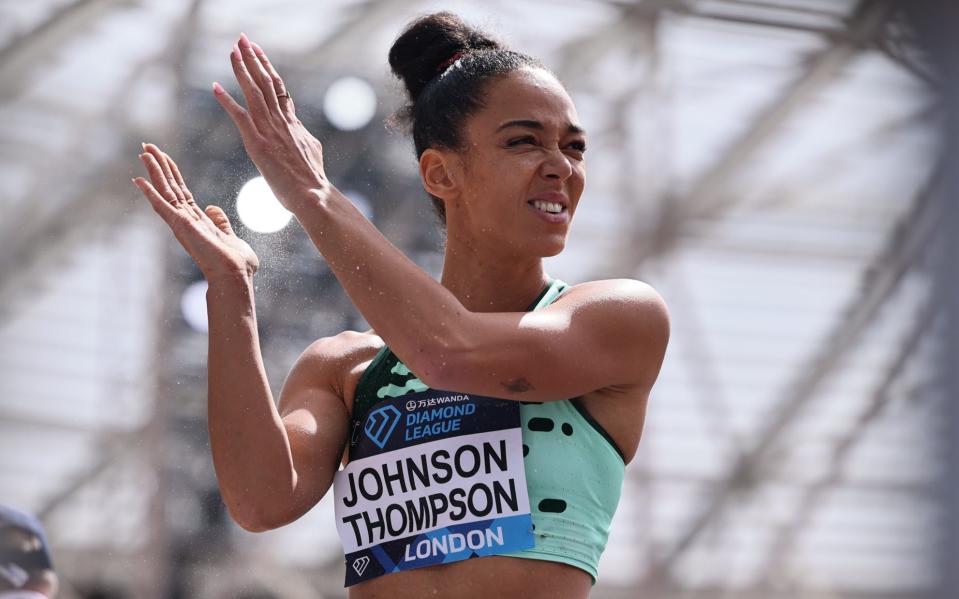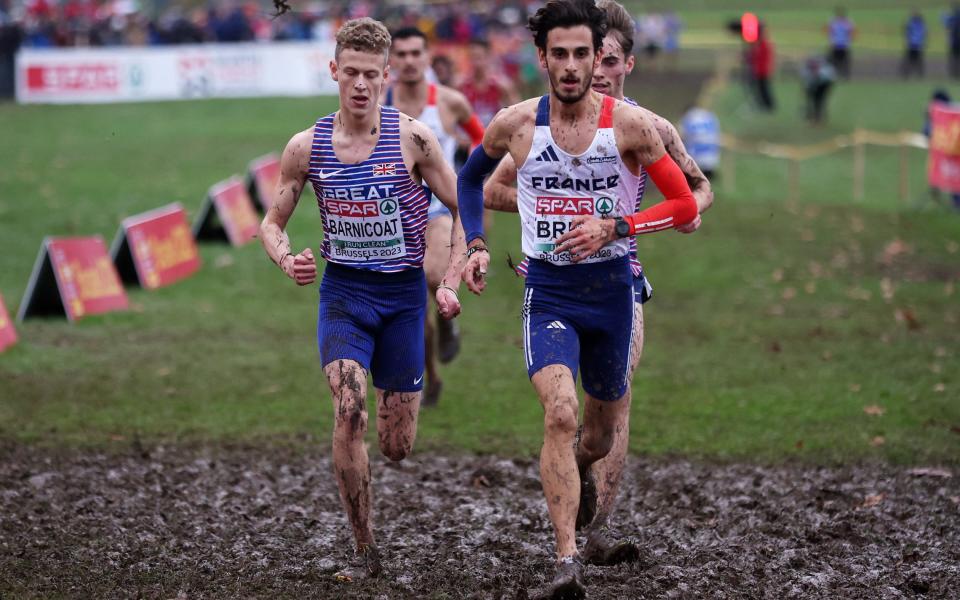There was a surprise guest at the Sports Journalists’ Association’s annual gala on Thursday. Linford Christie made a rare public appearance to honor Zharnel Hughes for surpassing his 30-year-old British record in the 100 metres, and whatever the past controversies, the long queue for selfies that quickly formed was a reminder of one indisputable fact.
Athletics was once a household name in the country’s consciousness alongside football and serial winners such as Christie were among the country’s most famous people.
A day earlier, UK Athletics had announced an annual loss of £3.7 million and chairman Ian Beattie had to explain how the sport currently functions without a main sponsor and even had to partially subsidize the BBC’s coverage of its showpiece Diamond League meeting. summer. Around £1.8 million in cuts have already been made since last year and with the Olympics just seven months away, “a much leaner organisation” is ominously predicted.
“It’s obviously been a tough time,” Beattie said.
A current athletics international puts it more bluntly.
“Everyone I’ve spoken to says it’s a complete mess,” the British athlete said Telegraph Sports.


One administrator describes a sport historically fraught with traditionalists resistant to change, which has long drifted between lucrative structures like football, golf or Formula 1 and those Olympic disciplines that can realistically expect only a quadrennial day in the sun.
“Athletics in Britain is at risk of becoming a once-in-four-years event that people remember enjoying but then forget,” the administrator said.
And yet, how many traditional Olympic sports could attract 50,000 spectators in one day, as athletics did at the London Stadium at the Diamond League meeting in July? Or bring in three million television viewers next month, which would surpass even the Eastenders if Katarina Johnson-Thompson regains the world heptathlon title?
It remains the crown jewel of the Olympic Games, truly global in scope, and a sport with the potential to launch the likes of Johnson-Thompson, Keely Hodgkinson, Zharnel Hughes and a new golden generation of middle-distance runners into another stratosphere in Paris next summer. .
Despite the support of the home fans, the London Diamond League suffered losses of almost £500,000 this year. The same meeting last year finished £800,000 in the red, while the indoor World Tour Event in Birmingham – axed from next year’s schedule – lost £500,000. Major stars command five- and sometimes even six-figure appearance fees, as well as expenses and prize money, meaning there is no prospect of breaking even without key commercial and broadcast partners.
So why can’t athletics in this country sell itself?
Conversations with many people within the sport invariably lead to two issues. The first is the loss in 2020 of a £3 million annual contract with the BBC to show major domestic events.
The other is the mismanagement and distracting infighting, summarized in an independent review three years ago by Dame Sue Street, which noted “a general culture of distrust” and the view from insiders that “things couldn’t get any worse”. .


Ed Warner, chairman until 2017, also wrote a scathing assessment earlier this year describing the situation as “scandalous” and railing against “unnecessary politics, the pursuit of vanity projects, timidity and simple sloppiness”. He absolved Beattie and CEO Jack Buckner of blame after they had only been in office since 2021 and 2022 respectively, but specifically explained how the BBC deal was wound down rather than renegotiated well before its expiry.
“Now you have the BBC thinking: ‘Do we need to innovate? Where else does UK Athletics go?,” said another industry insider. “Sky may spend money, but when you sit down with a big potential sponsor like Aviva, Sainsbury’s or Muller, they want a few million people to watch it. It’s a virtuous circle. If you don’t have a showcase, you can’t get the sponsor.”
After Niels de Vos and Warner left as CEO and chairman of the UKA respectively in 2018 and 2017, each after more than a decade, there have been nine different incumbents in their roles.
The longest CEO tenure between De Vos and Buckner was that of Jo Coates, who arrived just days before the Covid-19 lockdown in March 2020, before resigning in October the following year after a major disagreement over safeguarding policies. Coates says the BBC’s decision to pull out was known two years earlier and points out that the organization was virtually break-even in the 2020-2021 period.
“Unfortunately, there was a group of people in athletics who actively worked against me,” she says. Her biggest regret was whether to equalize distances in men’s and women’s cross country, admitting she had created an unnecessary storm within the sport.
This also caused great instability among the coaches. Longtime performance director Neil Black quit shortly before his death in 2020 after coming under fire for his support of Sir Mo Farah’s now disgraced former coach Alberto Salazar. Sara Symington and Christian Malcolm came and went before Stephen Maguire left as technical director last month, just weeks after leading Great Britain to 10 medals at this year’s World Championships.
Selecting only potential top-eight finishers who are labeled as ‘disgraceful’
Sources say this was due to disagreements over budget cuts. Paula Dunn has just been appointed interim head coach and she will be well aware of the unrest among athletes, especially on the fringes of British sport’s funded programs for potential Olympic medalists.
Telegraph Sports It has been told of a ‘them and us’ atmosphere where even free access to training facilities in Birmingham and Loughborough is reserved for the athletes chosen for funding, while others balance their training – and all associated costs – with different jobs .
There is also deep controversy over a policy that selects only athletes considered potential top-eight finishers for a World Championship or Olympic Games. It means athletes who qualified through their world rankings were not in Budapest over the summer, even at some events where Britain was not represented. One athlete this week called the policy “disgraceful” and said that as a result some athletes have missed out on thousands of pounds in sponsorship bonuses for appearing at a major championship.
“Not only does the British athlete lose experience and potential income, but that then shifts to a lower-ranked athlete from another country,” he said.
UK Athletics will continue to focus primarily on athletes capable of reaching the finals ahead of the Olympic Games, as well as a relay program that won four medals at the World Championships despite major tensions behind the scenes.
“You create positive momentum around success in this environment,” argues Buckner, who says the Olympics and World Championships do not necessarily provide the best development for athletes who are below the high qualification standards required by the UKA.
There is confidence for the Olympics and, supported by a still strong club scene, the European Cross Country Championships held in Brussels on Sunday showed the great potential. Innes Fitzgerald, Megan Keith and Will Barnicoat were among the individual gold medalists at Under 20 and Under 23 levels as part of a record-breaking performance that saw team gold in four of the seven events.


A new partnership with the London Marathon and Great Run is being discussed, which would see athletics events, including those organized by UKA, grouped into a broadcast offering.
Buckner, who has also pitched a documentary-style Olympic series to the BBC, “says there is no magic pot of gold” but they will continue the “hard work” in developing and pitching their product to broadcasters and sponsors. His tenure will be judged largely on what deals ultimately follow, and a renegotiated deal with Nike has at least helped avoid bankruptcy.
It means that UKA had £6.5m of cash in the bank at March 31, 2023, which was not included in the final profit/loss balance, and the organization expects to break even from 2025.
Frank Dick, who was director of coaching when British athletics was at its peak from 1979 to 1994, now emphasizes the need for stability and long-term planning. After all the bitterness, there is also a passionate plea.
“We have great athletes, great coaches and great administrators – for heaven’s sake, all of you, understand that you are in the same game, the same team, we wear the same colors, the same badge,” he says. “We are interdependent. If we don’t move forward together, we will die separately.
“This sport is fantastic – it changes people’s lives for the better – and we should praise its virtues.
“I have 100 percent confidence in Jack – he’s done a fantastic job with triathlon, he’s done a fantastic job with swimming. He will do a fantastic job in athletics. The problem is he has a ship with a hole in the side.
“A captain’s skills are being compromised. He can’t do it alone. And I just hope that all his energy won’t be used to get the water out.”